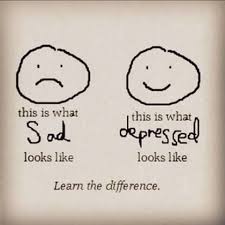
A whole lot.
Being "a bit down" for me is when you're feeling a bit rubbish, a bit fed-up, a bit de-moralised. You could have had a rough week or month. Life might be a bit of a struggle and it might feel like things are against you - at the moment.
You know things will pick up, it's just a patch you're feeling a bit out of sorts. Maybe you need some sleep, grab hold of your finances, hang out with some good mates? The sun will come out tomorrow!
Being sad is a temporary emotion. I was quite lucky, really, to have my first real period of sadness in my life not appear until I was 24 years old. My grandma passed away, and the grief was powerful. Overwhelming. Life- and perspective-changing.
However, with a little time, a little love from close family and friends, and mainly the closure her funeral brought, I was able, little by little to feel less sad. Life and family was carrying on, if a little shakily at the start. I felt normal in a while, despite it taking about two years for me to be able to talk about my grandparents without crying. (My grandpa died 13 months after my grandma). In a way I was a little pleased this emotion appeared, horrible as it was. It meant I really loved and would miss my dear grandparents, and their presence had brought a lot to my life. They will always remain important to me. Quick, change the subject before I tear-up!
Being depressed is the feeling I want to concentrate on, finally. Depression is a mis-understood illness (yes, AN ILLNESS), and is diagnosed when someone is feeling especially down for weeks or months at a time. It can be triggered by significant life events (e.g. a death in the family, redundancy), it can creep up on you in baby steps so you don't even notice it's advancement, or it can be caused by an imbalance in the brain.
Sometimes depression can be hard to spot, but knowing a bit more about it can make it easier to detect (and therefore easier to help your friend/family member), and easier to help yourself should you find yourself in this condition.
At some point in their lives, 10%-25% of women and 5%-12% of men will likely become clinically depressed. At any one time, 350 million people of all ages worldwide are suffering from depression.
Depression is NOT trivial.
You cannot just 'snap out of it'.

The difference between someone who's sad and someone who's depressed is that you probably won't realise they're depressed until the condition reaches a high level.
The physical symptoms of depression are quite 'normal' to feel, on an individual level. This is another reason it's quite hard to spot when a friend or relative is sliding downhill. Everyone gets tired, some people's appetite isn't regular on a good day, and who can say they've never had a bad night's sleep?
Hopelessness.
Not being able to see a way out of a situation.
Dark clouds building in your mind.
Not feeling like yourself - avoiding conversation, increase irritability, impatience beyond the norm
Increased tearfulness.
Lack of concentration and interest in things you normally enjoy.
It's important to be aware of these mental effects of depression. These mean you may not 'just have a bit of back ache', and it could be that it's more than 'a good night's sleep' that you need.
So what should you do if you've been feeling this way lately?
Talk to a friend or family member you can trust - perhaps someone who knows someone else with the condition of experienced it themselves a few years ago. If you don't know what to say, talking to a counsellor might be more productive - these professionals are not something to be scared of, and they know the right questions to ask to get you expressing yourself. There starts the path to healing. They may also recommend you speak to you doctor. Remember, you are in control, but taking some small steps like this will help you feel like you're making a move to beat this heaviness in your soul.
Go steady, don't rush, but try to get some exercise and don't stop your social life totally. Scale it back, for sure, to give your body a rest, (and not drinking for a few weeks or months will do you a world of good!), but don't lock yourself away.
And if you want to help someone who's suffering (in silence or otherwise)? Be there for them, don't put pressure on them to talk or change, help them to take the next little steps, be patient and continue to support them.
Check out these nine tips on helping someone with depression. You never know when or if you'll need the support yourself one day.
Be well,
Lou x
Find me on Facebook
...And on Twitter
Born to be a Tourist - home of my 2015 A2Z Blog Challenge!

 RSS Feed
RSS Feed
